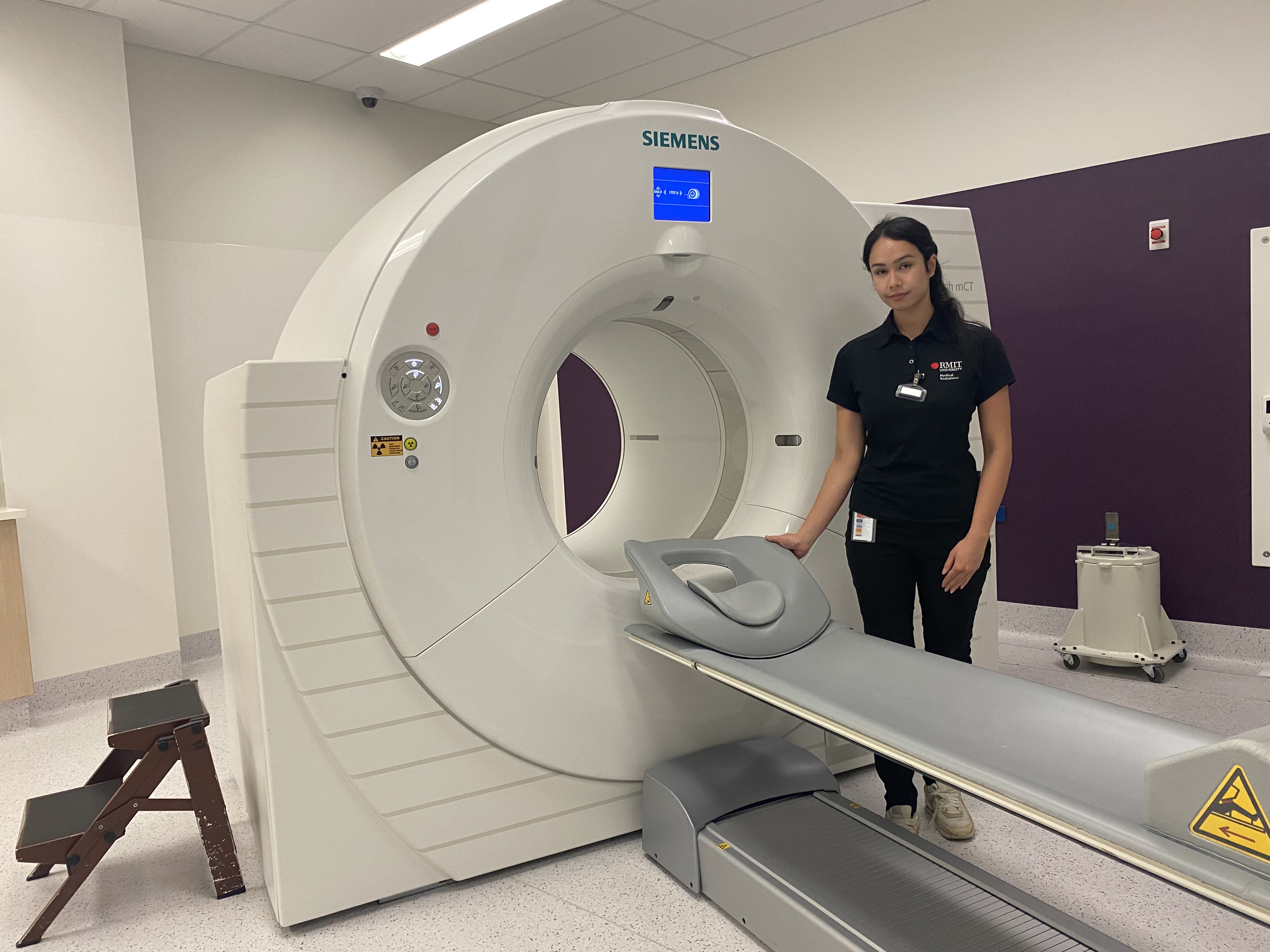
RMIT students have been granted extra support to help to build the nuclear medicine workforce outside of major cities.
RMIT University and Telix Pharmaceuticals have announced new financial support to the value of $30,000 per year over four years for RMIT nuclear medicine students on placement in rural, regional and remote areas.
The industry-funded bursary will assist students with the cost of accommodation, travel and meals as they develop their skills and give back to rural, regional and remote areas of Victoria.
Pictured: Nuclear medicine student, Tara Mathewson, on placement in Bendigo.
Tackling inequality in cancer diagnosis and treatment
Nuclear medicine and molecular imaging are used to treat and diagnose cancer and rare diseases.
Without access to these services, people living in the regions are less likely to be diagnosed early and are often left waiting many weeks or months for imaging of their cancer and potentially life-saving treatment.
The Victorian Labour Government promised an investment of $44 million in high-tech PET scanners (a sophisticated and essential piece of nuclear medicine diagnostic equipment) to be delivered to hospitals in Ballarat, Shepparton, Sunshine, Epping, Werribee, Warrnambool, Frankston and Wangaratta by 2026.
However, the sector faces major difficulties in attracting and retaining nuclear medicine technologists to operate this equipment.
Sending students into the regions
RMIT is the only Victorian university teaching students to become registered nuclear medicine technologists and scientists. This year, RMIT increased its student intake in this field by 50% in an effort to meet the demand for nuclear medicine graduates to work with the new PET scanners.
RMIT nuclear medicine stream leader Mark Scalzo insists that more support is needed to drive the rural, regional and remote nuclear medicine workforce.
“The Victorian government pledge is well intended, but without the requisite talent there is a real risk that these state-of-the-art facilities could sit dormant – or incur long wait times when patients are in desperate need of timely diagnosis and treatment,” Scalzo said.
“Our greatest barrier in offering nuclear medicine is finding placements for the 51 weeks required, especially in rural, regional and remote centres, with the cost to the student being a significant factor.
“The financial support from Telix will enable aspiring nuclear medicine scientists and technologists, regardless of background or location, to qualify in their desired career path and positively impact patient outcomes.”
Third year nuclear medicine student, Emily Robinson, will be one of the students receiving the new bursary. She is currently on a regional placement in Albury.
“This bursary removes a huge barrier to being able to study and practice in regional areas. For students who aren’t from here or don’t have family or somewhere to stay it’s the difference between being able to come and not,” Robinson said.
She has seen first-hand not just the impact of bolstering these services in the regions, but the benefits of becoming part of the solution.
“The sense of community is so much stronger in regional areas and I love being a part of that and really contributing to the community I’m working and living in.”
Third year student, Tara Mathewson, is also on placement – learning from practitioners in Bendigo.
“There are a lot of cases that are out of the box in rural areas, and you'll get interesting scans that are rare in city hospitals. For example, I was able to help identify a large and unusually placed melanoma that you wouldn’t see in a major Melbourne hospital,” Mathewson said.
“I’m not sure yet – but I’m leaning towards pursuing rural opportunities after graduation. Rural placements give you more autonomy, which will help me grow professionally.”
Life-changing technology and the people needed to use it
Telix Director of Global Patient Advocacy and Government Affairs, Simone Leyden AM, emphasised that supporting nuclear medicine graduates could save Victorian lives.
“We are delighted to support RMIT and the next generation of nuclear medicine talent to bring this life changing technology to the people who need it most, through workforce training and development,” Leyden said.
“It is a rapidly developing sector with the Asia Pacific region expected to witness the fastest growth of any radiopharmaceutical market worldwide. It is vital that our rural, regional and remote communities are not left behind.”
Several placement bursaries will be available per semester for students across all year levels, ensuring as many students as possible can access enriching education and experience outside of major cities.
Contact details:
For media enquiries, please contact Communications Manager, External Affairs and Media, Sarah Gates on 0448 045 579 or news@rmit.edu.au
Mark Scalzo, Simone Leyden AM and nuclear medicine students, Emily Robinson and Tara Mathewson, are available for interview.
Images are available here: https://cloudstor.aarnet.edu.au/plus/s/oHxw4Gu0NblbjkA

